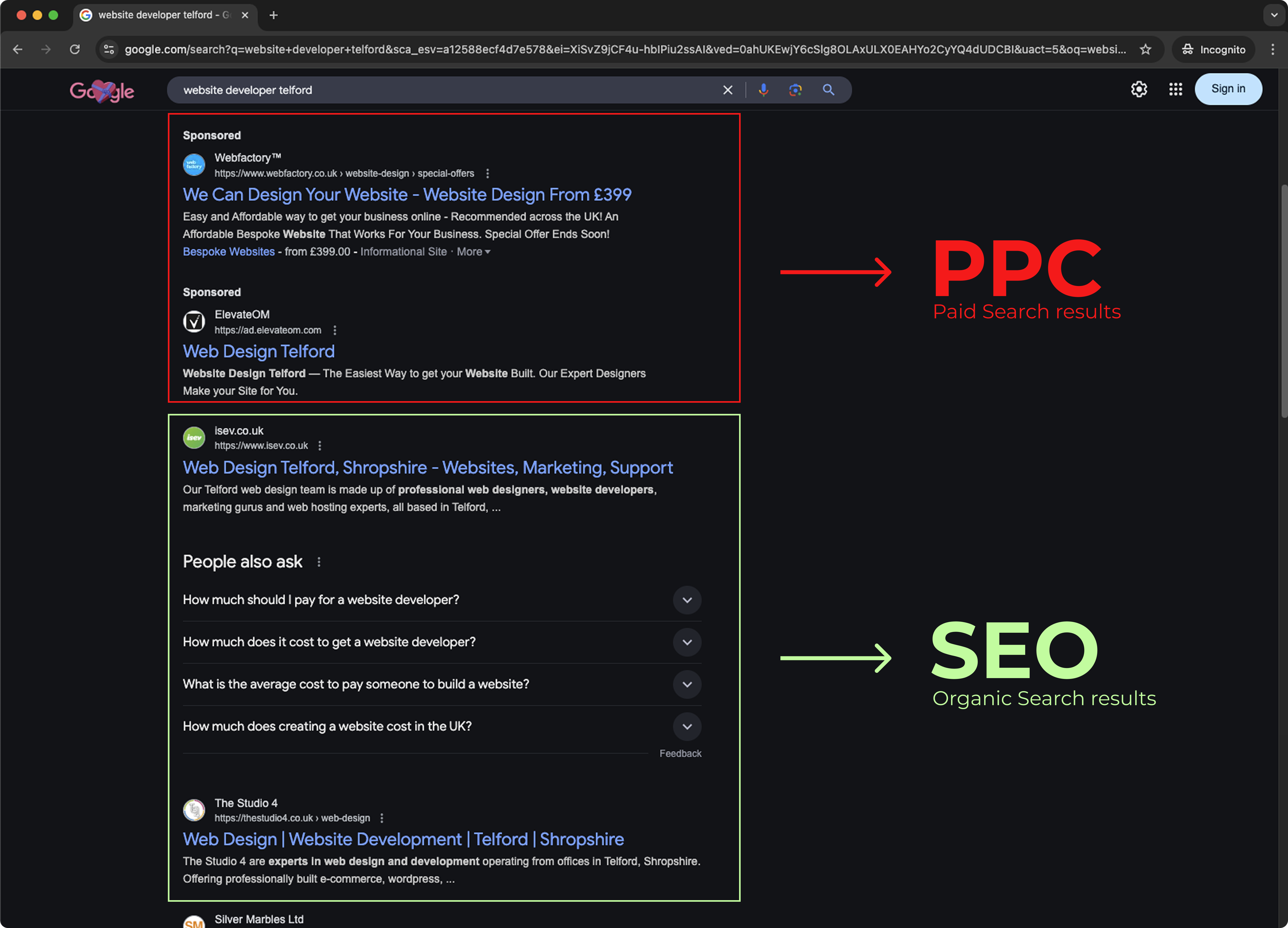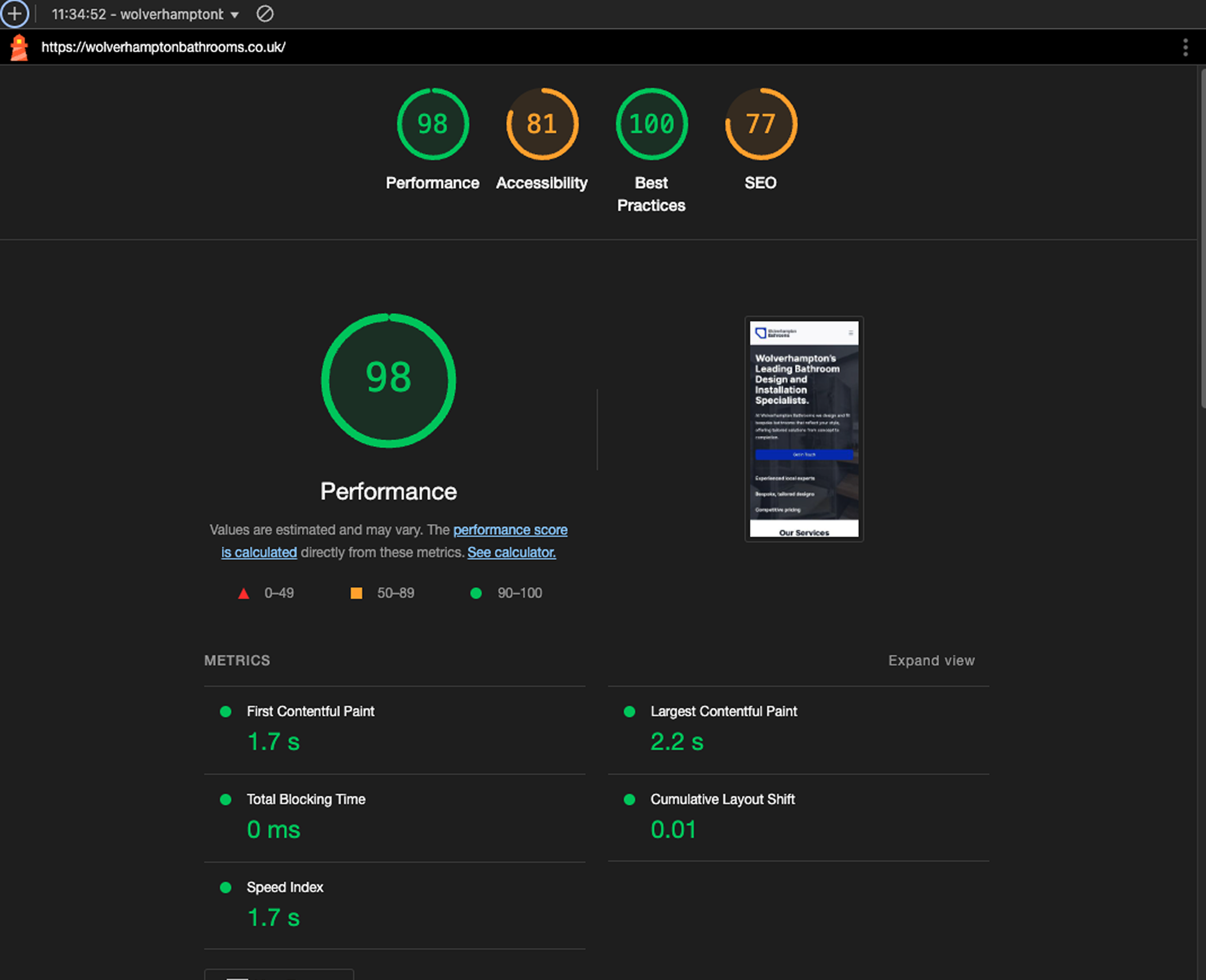
February 20,2025
How to review your SEO marketing
If you want your website to effectively work for your business, it needs to be more than just exist—it needs to attract visitors. But with so much competition online, how do you ensure people find you?
That’s where Search Engine Optimisation (SEO) comes in.
A well-optimised website can drive more traffic, build trust, and ultimately lead to more conversions. But SEO isn’t just about keywords—it involves everything from technical improvements to high-quality content and improving user experiences.
In this guide, we’ll break down the key aspects of SEO, why it’s important, and how you can review and improve your website’s ranking. Whether you’re new to SEO or looking to refine your strategy, this article will help you get started.
In this article:
- What is SEO?
- Understanding search results
- Why is SEO important?
- How to review and improve your SEO
- Final thoughts
What is SEO
SEO or ‘Search engine optimisation’ is the process in how you get your website found in search engines, such as Google and Bing. There are a range of different elements that affect a website’s SEO, from technical improvements and optimising website content to offsite link building to build your brand’s authority. Your SEO efforts are what help search engines understand your website’s relevance, and authority, that determines where it shows in the search results for users’ queries.
Think of SEO as a checklist that determines how well your site meets the ‘criteria’ for visibility. The more boxes your website ticks, the higher your site will rank in search engines.
- Relevance – how relevant is your website content, how close does it match what a user is searching for?
- Authority – Search engines will evaluate your site’s credibility. This can be a range of areas such as testimonials, socials, user engagement, external links to your website and even having a Google Business Profile. The more ‘trustworthy’ a site, the higher it can rank.
- User Experience – A well designed, fast loading and mobile friendly website will rank higher. Following design, navigation and responsive principles will help your sites be easier to use, increasing the user engagement. Click here to learn more on user experience.
- Technical performance – Search engines will evaluate your site’s structure, meta data, SSL security and more.
- Quality – Regularly updated websites with high quality content are more relevant to users, if your site is active and relevant it will help you stay ahead of competitors.
A well-optimised website can drive long-term traffic which can help to increase enquiries.
Understanding Search Results with SEO
When you search for something on Google, you’ll typically see a few types of results, two of which include: paid ads and organic (SEO) results.
As is demonstrated in the image below, paid search results appear at the top and bottom of the page, marked as “Sponsored”. This means that these businesses pay for their ads placement through Pay-Per-Click (PPC) advertising. Which can be very effective for immediate visibility, but for a price, which can vary based on the competitiveness of what is being searched.

On the other hand, we have organic search results, which as we’ve mentioned are earned through SEO rather than paid efforts. Websites that rank here have built authority, relevance, and trust through high-quality content, technical optimisations, and more.
As you can see, for the search ‘website developer telford’, we are ranking first in organic search results. Which means our site is considered to be the most relevant and authoritative for both this search (Website developer), in this location (Telford).
If you need help refining your SEO, we’re here to help. Find out more about SEO marketing here.
Why is SEO important?
SEO is crucial for any business with a website, as it enhances online visibility in an increasingly competitive market, which helps with driving more traffic to your site.
Increase traffic – The higher you rank on Google, the more traffic your website will produce. It makes it easier for potential customers to find you.
Builds trust – In order to rank for Google, you will need to take steps to make your website credible. As such this will help to build trust. People tend to trust higher ranking websites more, specifically active sites with things like testimonials and google ratings.
User experience – You will want to make your website faster, and easier to navigate all of which, improves your users experience. For example, did you know that people on average wait around 3 seconds for a website to load before they go elsewhere?
Competitive advantages – If competitors have invested some time in efforts into SEO then your business risks falling behind. People will be more likely to choose your competitor over your services, which is why it is so important to attract potential customers before they find and choose your competitors.
So, how do you know if your SEO efforts are working?
Evaluating your website SEO helps ensure you’re driving the right traffic, improving your search rankings, and achieving your business goals. It allows you to identify what’s working for your business, what isn’t and adjust different areas as needed.
How to Review your Websites SEO
Reviewing SEO can be a daunting prospect and it can be difficult to know where to start. It mostly however, comes down to data analysis.
You will need to assess various factors, from keyword relevance to technical performance. Here’s how to review with your SEO.
How to research and analyse keywords & Competitors
A strong SEO strategy starts with research. Begin by reviewing the keywords you’re currently targeting.
Are they still relevant? You can figure this out by seeing if they are bringing in traffic, or if they still have a good amount of search volume.
We would recommend you look at the search results for your main key terms—Take a look at what type of content ranks highest and if competitors are outranking you. Assess their content and website to identify potential gaps in your own approach.
Keyword research should be an ongoing process, afterall, search trends evolve, so tracking new keywords and adding them naturally into your content can help maintain relevance. Just be sure to track your results so that you can identify which pages are attracting traffic and which need improvement.
How to Evaluate your Websites content
Your website’s content plays a crucial role in SEO success.
Start by reviewing your blogs and web page content to ensure they are ‘well-written’. This means they will be informative, provide insight and answer questions that align with your user intent. For example, are your articles engaging, and are they accurate, up to date and do you satisfy and answer the search query you show for?
Image data is another important element. Check that your website’s images have the following…
- Image quality – Ensure that the quality of your image is up to par. To keep your users engaged, images on your site should be relevant and clear.
- No blurry images, and be sure to use relevant imagery. If you’re selling a service that involves people, then your images should reflect that, the same would apply if you were using your website to sell a software.
- Relevant titles – Make sure the file name of the imagery on your site is appropriate, so that it’s obvious what it is.
- Appropriate alt text – this is the information you provide on imagery that improves your website’s accessibility. You might label the below image as ‘man designing a website on a Mac’.

Keeping content updated is also essential as search engines favour info that is more recent, so be sure to revisit older articles to refresh facts and improve their readability. Aim to publish at least two well-researched blog posts a month. If you’re a small business, consider focusing on local SEO by incorporating location-based content.
Meta descriptions and title tags should also be reviewed and optimised. These small snippets can influence things like people clicking on your site in the search results (click-through rates) and so they should accurately describe each page’s content.
As a bonus tip, be sure to include the keywords you are tracking within your content.

Above is an example of Meta details. Including the title, and description. The bold ‘professional web designers’ being relevant to the search.
Note: These details are a separate entity to your website page’s title and content, so they can be optimised and adjusted to suit the needs of the business.
How to Track your SEO Performance
Monitoring your website’s SEO performance is crucial for making improvements. Google Search Console and Google Analytics provide insights into how visitors interact with your site, what searches (keywords drive traffic, how many conversions your site has (e.g. how many people fill in a quote form) and where potential issues may lie.
You can also use rank tracking tools to help you see how your keywords perform over time which will help you to optimise your website overall.
Off-site SEO Considerations
SEO isn’t just about what’s on your site—it also involves external factors.
Directories: you could check whether your business is listed on relevant directories. And, if it is listed on directories, then you could review the following the relevance of the directory and whether it is helping your business to bring in traffic.
Google business profiles: An important consideration is to ensure you have a Google Business Profile. If you have one then the next step is to review whether your Google business is fully optimised with…
- Up-to-date information
- Relevant Images
- Links to your website and social media accounts.
- Testimonials
- Testimonial responses
- Questions and answers
- Locations and directions
- Contact information – such as phone number, address, and opening hours.
Competitor analysis: Competitor analysis is another off site consideration, as this can also reveal what competitors are doing that your business isn’t. Review their website, what searches they come up for and even take a look at their socials to review what content types they are pushing and which of these are successful (e.g. what is the interaction like?).
You can also review things like testimonials, oftentimes customers will mention things they lacked from a service. This could be an opportunity for your business.
How to Review Technical SEO
Technical aspects of SEO can be a bit more challenging but are crucial for site performance.
This includes things like…
- Website speeds
- Mobile optimisation
- Redirects
- Sitemaps
- Site scans
Technical aspects shouldn’t be overlooked. Be sure to run site speed tests to ensure fast load times, particularly on mobile devices. Click here to run your website through a speed test.
Below is an example of one of our websites most recent speed checks. This is after a variety of optimisations.

These factors impact how easily search engines can crawl and index your site (which will impact your website’s overall ranking) as well as how users experience your site. Many of these steps will require professional assistance, so it’s worth seeking expert support if needed.
Get Expert SEO Assistance
SEO is complex, and while many aspects might be manageable, we would recommend seeking professional support to ensure your website remains ranking and relevant. Whether it’s optimising content, improving technical performance, or developing a long-term strategy, working with SEO experts will ensure you get the best results. If you need help refining your SEO, we’re here to assist—get in touch to start optimising your website today. Get in touch today!
Final Thoughts
SEO is an essential part of any successful website, helping businesses to stay ahead of the competition. By focusing on key areas such as keyword research, content quality and more you can improve your site’s ranking. As such, regularly reviewing your website’s SEO ensures that your website remains relevant, and competitive.
Ultimately, If you want to maximise your website’s potential, investing time into SEO is a must.




